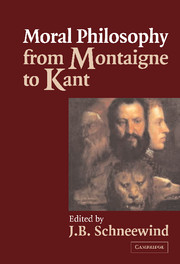Book contents
- Frontmatter
- Contents
- Preface
- Acknowledgments
- Foreword to the One-Volume Reprint
- Introduction
- PROLEGOMENA: SOME QUESTIONS RAISED
- PART I REWORKING NATURAL LAW
- PART II INTELLECT AND MORALITY
- PART III EPICUREANS AND EGOISTS
- PART IV AUTONOMY AND RESPONSIBILITY
- The Earl of Shaftesbury
- Francis Hutcheson
- Joseph Butler
- David Hume
- Christian August Crusius
- Richard Price
- Jean-Jacques Rousseau
- Thomas Reid
- Immanuel Kant
- Supplemental Bibliography
Francis Hutcheson
Published online by Cambridge University Press: 05 June 2012
- Frontmatter
- Contents
- Preface
- Acknowledgments
- Foreword to the One-Volume Reprint
- Introduction
- PROLEGOMENA: SOME QUESTIONS RAISED
- PART I REWORKING NATURAL LAW
- PART II INTELLECT AND MORALITY
- PART III EPICUREANS AND EGOISTS
- PART IV AUTONOMY AND RESPONSIBILITY
- The Earl of Shaftesbury
- Francis Hutcheson
- Joseph Butler
- David Hume
- Christian August Crusius
- Richard Price
- Jean-Jacques Rousseau
- Thomas Reid
- Immanuel Kant
- Supplemental Bibliography
Summary
Introduction
Francis Hutcheson was born in 1694 into a family of Scottish emigres in northern Ireland. Educated first in Ireland, he then studied theology in Glasgow and, like his grandfather and father, became a Presbyterian minister. Hutcheson subsequently returned to Ireland, where he spent some years in Dublin teaching in a Presbyterian academy. He soon attracted the attention of several leaders of opinion, in particular Robert Viscount Molesworth, one of the foremost advocates of classical republicanism as a guide to current politics. (See the section “The Classical Republic” in the Introduction to this anthology.) Hutcheson spent much time in the Molesworth circle, and Molesworth encouraged him to publish his first book, the Inquiry into the Original of Our Ideas of Beauty and Virtue (1725).
In two later short works, published together in 1728 as An Essay on the Nature and Conduct of the Passions, with Illustrations on the Moral Sense, Hutcheson elaborated on his moral psychology, defended his views, and attacked opposing positions with considerable acuity. He was then called to the professorship of philosophy at the University of Glasgow, where he remained until his death in 1746. Hutcheson's early preaching in Ireland had drawn protests against its unorthodoxy; more formal accusations of heresy were made while he was at Glasgow, but he was not officially censured. He belonged to the moderate group in the Scottish church, taking a more lenient view of grace and predestination than had been traditional and showing less concern about abstruse points of the theology of the trinity.
- Type
- Chapter
- Information
- Moral Philosophy from Montaigne to Kant , pp. 503 - 524Publisher: Cambridge University PressPrint publication year: 2002
- 1
- Cited by

